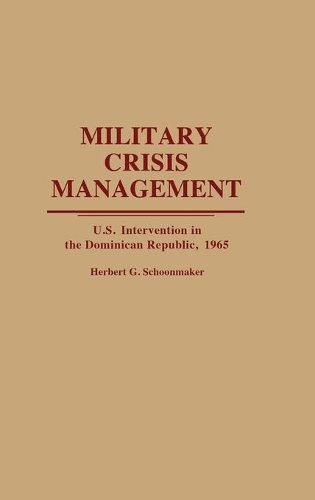
Military Crisis Management: U.S. Intervention in the Dominican Republic, 1965
(Hardback)
Publishing Details
Military Crisis Management: U.S. Intervention in the Dominican Republic, 1965
By (Author) Herbert G. Schoonmaker
Bloomsbury Publishing PLC
Praeger Publishers Inc
15th February 1990
United States
Classifications
Tertiary Education
Non Fiction
History of the Americas
327.7307293
Physical Properties
Hardback
168
Description
This account of the 1965 Dominican intervention is a case study in U.S. crisis management. Herbert Schoonmaker analyzes the role and management of U.S. military forces in the Dominican crisis. Like other Cold War interventions, the Dominican intervention demonstrated the use of rapidly reacting, joint military forces to achieve limited political objectives. It also represents a good vehicle for analyzing U.S. civilian-military relationships during this kind of military operation. At the same time the civil strife continued in Santo Domingo, U.S. military forces engaged in a variety of duties, both combat and peacekeeping, and did so while the Organization of American States, the United Nations, and U.S. government teams attempted to negotiate a peaceful settlement. Such a complex environment, Schoonmaker argues, necessitated tight civilian control of the engaged armed forces and required restraint in carrying out their combat duties. In addition to the political-military factors, Schoonmaker also focuses on the joint army-navy-air aspects of the operation. He concentrates on the uniqueness of the intervention which makes the lessons learned from it applicable in some circumstances, but not in others. A study of the Dominican intervention is important because of its implications for defense needs and structure in a time of tight military budgets. The author also outlines the problems associated with quick-reacting forces and indicates the necessity for efficient intelligence, communications, logistics, and command and control. This book is must reading for military theoreticians and strategists, historians, and political scientists.
Reviews
.,."Since the demise of the Warsaw Pact, these books have become more relevant as our military and diplomatic energies now center on long range hemispheric planning. Schoonmaker's book provides the broader base as the ultimate generic after action report. Its disciplined categories comprise the crisis management implications of almost any military operation. But Palmer's book is more fun to read."-Infantry
...Since the demise of the Warsaw Pact, these books have become more relevant as our military and diplomatic energies now center on long range hemispheric planning. Schoonmaker's book provides the broader base as the ultimate generic after action report. Its disciplined categories comprise the crisis management implications of almost any military operation. But Palmer's book is more fun to read.-Infantry
..."Since the demise of the Warsaw Pact, these books have become more relevant as our military and diplomatic energies now center on long range hemispheric planning. Schoonmaker's book provides the broader base as the ultimate generic after action report. Its disciplined categories comprise the crisis management implications of almost any military operation. But Palmer's book is more fun to read."-Infantry
Author Bio
HERBERT G. SCHOONMAKER is Commander, U.S. Naval Reserve (Retired) and holds a Ph.D from the University of Georgia. During his career as a military historian with the U.S. Army and Air Force, he authored a considerable number of classified studies.
